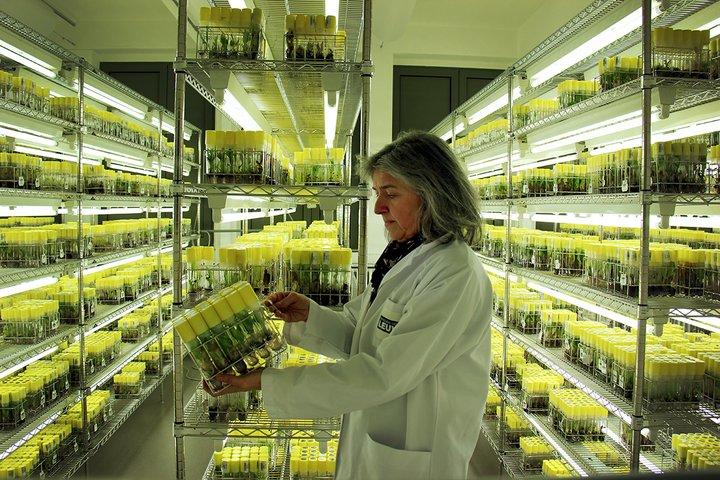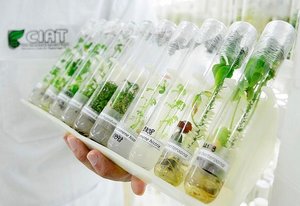Investing in safeguarding crop diversity for a food-secure future

Last week M. Ann Tutwiler, Director General, Bioversity International, spoke at the Global Crop Diversity Trust Pledging Conference on behalf of CGIAR. This event convened 50 nations to save the global common good of crop diversity in perpetuity. Read her latest 'DG Dialogues' blog about the event.
Last week M. Ann Tutwiler, Director General, Bioversity International, was invited to speak at the Global Crop Diversity Trust Pledging Conference on behalf of CGIAR and Bioversity International. She reflects on the importance of the event in her latest blog for DG Dialogues.
Last week I was invited to speak at the Global Crop Diversity Trust Pledging Conference in Washington on behalf of CGIAR and Bioversity International. This event convened 50 nations to save the global common good of crop diversity in perpetuity - a major step towards safeguarding the international crop collections that are vital for food security.
The CGIAR’s eleven genebanks manage 730,000 accessions of vital crop diversity in 35 collections held in 15 countries. These collections include tree species, forages, crop wild relatives, root and tuber crops and a range of cereals and grain legumes. There is also Bioversity International’s own International Musa Transit Centre in Belgium that holds the world’s largest collection of banana germplasm. The Global Crop Diversity Trust supports CGIAR genebanks not only from a financial perspective but also from an operational one by providing tools and support for managing them efficiently, and coordinating between them to ensure that all crop diversity is protected, accessible and used.
The attendance of 50 nations at this event highlights the international recognition of the importance and urgency of safeguarding crop diversity – a vital resource to ensure food production systems are sustainable, able to adapt to climate change, and can provide nutritious food. It is also a testament to the success of the Crop Trust, which has come a long way since its inception.
I am proud to see how the Crop Trust has gone from strength to strength.
I am also proud of the role Bioversity International played in its creation, when the idea of building an endowment fund to secure crop collections in perpetuity began to surface.
In 1993, the newly formed Convention on Biological Diversity raised concerns about the conservation of crop diversity. This was followed in 1994 by the signing of ‘in-trust’ agreements between the UN Food and Agriculture Organization (FAO) and CGIAR centers that required the centers to maintain and freely distribute plant genetic resources for food and agriculture collections forever. At that time genebanks around the world were facing irregular and low budgets.
 Bioversity International and CGIAR were concerned that this financial instability was putting precious resources conserved in genebanks at risk, along with the capacity to share them with researchers and farmers around the world. This was also the time in which the International Treaty on Plant Genetic Resources for Food and Agriculture came into force – a multilateral system whereby countries agree to pool and share the plant genetic resources of 64 crops and forages for food and agriculture.
Bioversity International and CGIAR were concerned that this financial instability was putting precious resources conserved in genebanks at risk, along with the capacity to share them with researchers and farmers around the world. This was also the time in which the International Treaty on Plant Genetic Resources for Food and Agriculture came into force – a multilateral system whereby countries agree to pool and share the plant genetic resources of 64 crops and forages for food and agriculture.
These factors together resulted in Bioversity International’s recommendation (then called the International Plant Genetic Resources Institute) to establish an endowment fund to support the CGIAR Centers' In Trust Collections in perpetuity so the CGIAR centers could fulfill their obligations. This recommendation was endorsed by CGIAR in 2000, leading to a formal commitment to establish the Crop Trust by FAO and CGIAR in 2002. That the Crop Trust has come such a long way in such a short time is a testament to its leadership and staff who have driven forward its development.
Bioversity International manages the world’s largest collection of bananas held at the International Musa Transit Centre (ITC). The collection (pictured top) today houses more than 1,500 samples of edible and wild species of banana that have come from all over the world, and it is supported by the Government of Belgium, the CGIAR Research Program on Managing and Sustaining Crop Collections, and the Global Crop Diversity Trust.
We are not just safeguarding the world’s banana diversity; we are also ensuring it can be freely accessed and used by anyone who needs it. Between 1985 and 2014, the ITC distributed over 17,000 samples of accessions to users in 109 countries. On average, 75% of the samples go to users in the main banana growing regions – Africa (27%), the Americas (25%) and Asia and Pacific (23%) with the remainder going to universities and research centers in Europe. For example, our partners at Wageningen University in the Netherlands are currently screening varieties from the collection for resistance to Fusarium wilt – a devastating banana disease present in Asia, Africa and Australia.
Bioversity International also utilizes the genebank to conduct research-for-action efforts around the world. We sent vitamin A-rich banana varieties from the ITC to Burundi and the Democratic Republic of the Congo as part of our ongoing nutrition research in East Africa, and are screening materials held in the collection for resistance to drought. This is particularly important given the predicted rise in temperatures in the tropical and subtropical areas where bananas are cultivated.
Through our work to conserve the world’s banana diversity in perpetuity, we have become a leader in the field of plant cryopreservation, a method that ensures the long-term conservation of vegetatively-propagated crops. We have developed protocols for over 30 plant species including banana, apple, cassava, potato and tomato. More than 60% of the collection at the ITC is cryopreserved.
The Global Crop Diversity Trust Pledging Conference meeting paved the way for doubling the Crop Trust Endowment Fund – reaching USD 300 million. This is an incredible achievement, especially when there are also many competing demands on donors’ funds. Bioversity International encourages donors to continue their support for conserving the world’s irreplaceable genetic diversity and for making this diversity available to reduce malnutrition, adapt to climate change, reduce the losses from pest and diseases, and increase agricultural yields.
M. Ann Tutwiler
Notes:
The Crop Trust Pledging Conference took place in Washington, DC on 15th April, convening 50 nations to build a broad coalition to save the global common good of crop diversity. The Governments of Germany and Norway co-chaired the conference.
More information can be found here.
The press release issued following the event can be read here.
Bioversity International is one of the 15 agricultural research centers around the world that are members of the CGIAR Consortium– a global partnership for a food-secure future.
Photo top: Bioversity International scientist Ines Van den Houwe at the International Musa Transit Centre.
Credit: Bioversity International/ N. Capozio
Photo bottom: Samples of tropical forages conserved in vitro at CIAT gene bank in Colombia. Seeds of these plants were recently sent for conservation to the Global Seed Vault in Svalbard, Norway.
Credit: CIAT/N. Palmer
